Dockworkers registration now mandatory, says NIMASA DG
"No terminal or company shall continue to engage the services of unregistered dockworkers for cargo handling at their work locations.";

The Nigerian Maritime Administration and Safety Agency (NIMASA) has urged international oil companies, terminal-jetty operators, and other companies involved in stevedoring in the country to refrain from engaging unregistered dockworkers.
The Director General of NIMASA, Dr Dayo Mobereola, stated this in a statement issued by the Head, Public Relations of NIMASA, Mr Edward Osagie, in Lagos on Friday.
Mobereola said that all stakeholders, including dock labour employers and stevedoring companies, were encouraged to apply for new operating licenses or renew expired ones within a 30-day moratorium period.
“This requirement is stipulated by the NIMASA Act of 2007 and outlined in the NIMASA Stevedoring Regulations of 2014, which mandates strict compliance from all maritime operators.
“There is need for stakeholders to comply with extant laws and regulations.
”No terminal or company shall continue to engage the services of unregistered dockworkers for cargo handling at their work locations.
“This move is part of our broader effort to ensure safe and regulated operations within Nigeria’s maritime industry.
“Compliance with these regulations will enhance our ability to maintain an up-to-date database of dockworkers operating in the country.
“It will also improve our planning processes, as we are committed to developing their capacity to meet globally accepted standards for dockworkers in Nigeria,” he said.
Mobereola said that NIMASA intended to enforce full compliance after the moratorium period.
According to him, NIMASA Act, 2007, Part IX, Section 27, addresses the registration of dockworkers, which focuses on Maritime Labour.
He said that the NIMASA act ensures the Registration, Regulation, and control of Maritime Labour, including dockworkers.
The NIMASA boss said that the Act also assigns the Agency the responsibility of maintaining standards in accordance with international best practices.
He, therefore, called on stakeholders to consult the full regulations available on the NIMASA website.

